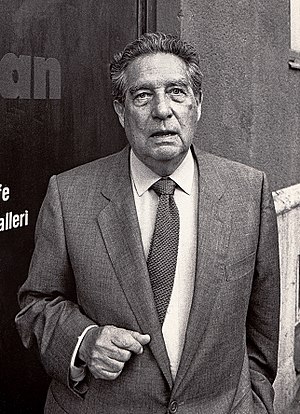
“Wisdom lies neither in fixity nor in change, but in the dialectic between the two.”
Share this quote:
“Literature is the expression of a feeling of deprivation, a recourse against a sense of something missing. But the contrary is also true: language is what makes us human. It is a recourse against the meaningless noise and silence of nature and history.”
Share this quote:
“Social criticism begins with grammar and the re-establishing of meanings.”
Share this quote:
“We are condemned to kill time, thus we die bit by bit.”
Share this quote:
“Deserve your dream.”
Share this quote:
“Man does not speak because he thinks; he thinks because he speaks. Or rather, speaking is no different than thinking: to speak is to think.”
Share this quote:
“What sets worlds in motion is the interplay of differences, their attractions and repulsions. Life is plurality, death is uniformity. By suppressing differences and pecularities, by eliminating different civilizations and cultures, progress weakens life and favors death. The ideal of a single civilization for everyone, implicit in the cult of progress and technique, impoverishes and mutilates us. Every view of the world that becomes extinct, every culture that disappears, diminishes a possibility of life”
Share this quote:
“The house of delusions is cheap to build but drafty to live in.”
Share this quote:
“Love thy neighbor--and if he happens to be tall, debonair and devastating, it will be that much easier.”
Share this quote:
“Life is, in fact, a battle. Evil is insolent and strong: beauty enchanting but rare; goodness very apt to be weak; folly very apt to be defiant; wickedness to carry the day; imbeciles to be in great places, peolpe of sense in small, and mankind generally unhappy. But the world as it stands is no illusion, no phantasm, no evil dream of a night; we wake up to it again for ever and ever; we can neither forget it nor deny it nor dispense with it.”
Share this quote:
Beyond myself, somewhere, I wait for my arrival.
Share this quote:
This is perhaps the most noble aim of poetry, to attach ourselves to the world around us, to turn desire into love, to embrace, finally what always evades us, what is beyond, but what is always there – the unspoken, the spirit, the soul.
Share this quote:
Mineral cactai,quicksilver lizards in the adobe walls,the bird that punctures space,thirst, tedium, clouds of dust, impalpable epiphanies of wind.The pines taught me to talk to myself.In that garden I learnedto send myself off.Later there were no gardens.
Share this quote:
because two bodies, naked and entwined,leap over time, they are invulnerable,nothing can touch them, they return to the source,there is no you, no I, no tomorrow,no yesterday, no names, the truth of twoin a single body, a single soul,oh total being...
Share this quote:
To reduce poetry to its reflections of historical events and movements would be like reducing the poets words to their logical or grammatical connotations.
Share this quote:
When a society decays, it is language that is first to become gangrenous. As a result, social criticism begins with grammar and the re-establishing of meanings
Share this quote:
life is other, always there,further off, beyond you andbeyond me, always on the horizon,life which unlives us and makes us strangers,that invents our face and wears it away
Share this quote:
better the crime,the suicides of lovers, the incest committedby brother and sister like two mirrorsin love with their likeness, better to eatthe poisoned bread, adultery on a bedof ashes, ferocious love, the poisonousvines of delirium, the sodomite who wearsa gob of spit for a rose in his lapel,better to be stoned in the plaza than to turnthe mill that squeezes out the juice of life,that turns eternity into empty hours,minutes into prisons, and time intocopper coins and abstract shit
Share this quote:
The object of poetic activity is essentially language: whatever his beliefs & convictions, the poet is more concerned with words than what these words designate.
Share this quote:
CodaPerhaps to love is to learnto walk through this world.To learn to be silentlike the oak and the linden of the fable.To learn to see.Your glance scattered seeds.It planted a tree. I talkbecause you shake its leaves.
Share this quote: